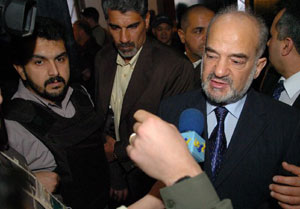
Iraqi Vice President Ibrahim al-Jafaari attends a press
conference to announce the final results of Iraq's national elections February
17. (Photo:Xinhua)
Iraq's Shiite alliance has won a majority in the country's new National
Assembly, the Electoral Commission announced Thursday.
According to final results of the Jan. 30 elections, the United Iraqi
Alliance was allocated 140 seats in the 275-seat National Assembly.
Meanwhile, the Kurdish parties won 75 seats and the list of the outgoing
interim Prime Minister Iyad Allawi won 40 seats, said the commission.
The remaining 20 seats were allocated to nine other parties and coalitions,
including the Iraqis list led by the outgoing interim President Ghazi al-Yawar.
The commission announced the allocation of the seats after it certified the
final results of the Jan. 30 elections, after investigating a number of
complaints.
"The members of the Electoral Commission expressed their acceptance for the
justice of the results that were announced few days ago," said Abdul Hussein
Hindawi, the head of commission.
"They certified these results after studying all complaints and objections
submitted to the commission," he said, adding that the complaints were "the most
important" in the electoral process.
"We are ready to share this experience with other countries in the region,"
he stressed.
For his part, Carlos Valenzuela, the chief UN election expert in Iraq, said,
"The elections were not perfect they were never meant to be but they were
extremely good elections."
Some 8.55 million Iraqis cast their votes in the Jan. 30 parliamentary
elections.
The United Iraqi Alliance, backed by Iraq's Shiite Grand Ayatollah Ali
al-Sistani, won 4.075 million votes, or 48.1 percent of the ballots.
The Kurdistan Coalition followed with 2.175 million votes, or about 25
percent, while 1.168 million votes went to Allawi's list.
The National Assembly will choose a president and two deputy presidents, who
will in turn designate a prime minister to form a cabinet.
Once the cabinet is approved by a majority of the assembly, theprime minister
will lead the transitional government.



